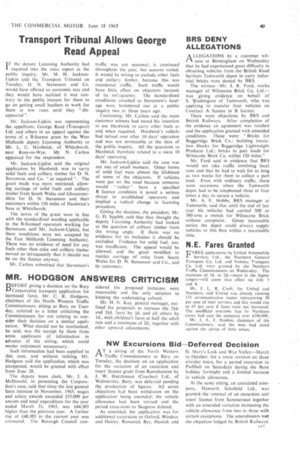Transport Tribunal Allows George Read Appeal
Page 51

If you've noticed an error in this article please click here to report it so we can fix it.
IF the deputy Licensing Authority had inquired into the rates aspect at the public inquiry. Mr. M. H. JacksonLipkin told the Transport Tribunal on Tuesday, D. N. Stevenson and Co. would have offered an economic rate and they would have realized it was contrary to the public interest for them to go on getting small hauliers to work for them at low rates until they "disappeared ".
Mr. Jackson-Lipkin was representing the appellants, George Read (Transport) Ltd. and others in an appeal against the terms of a B-licence grant by the West Midlands deputy Licensing Authority to Mr. L. C. Hardwick, of Whitchurch, near Ross-on-Wye. Mr. N. Carless appeared for the respondent.
Mr. Jackson-Lipkin said the original application by Hardwick was to carry solid fuels and colliery timber for D. N. Stevenson and Co. "as required". The grant made was more restricted, allowing carriage of solid fuels and colliery timber from South Wales and Gloucestershire for D. N. Stevenson and their customers within 150 miles of Hardwick's base at Whitchurch.
The terms of the grant were in line with the standardized wording applicable to the B-licensed operators working for Stevenson, said Mr. Jackson-Lipkin, but these conditions were not accepted by the East Midlands Licensing Authority. There was no evidence of need for any fuels other than coke and colliery timber moved so infrequently that it should not be on the licence anyway.
Mr. Carless submitted that Stevenson's traffic was not seasonal; it continued throughout the year, but seasons varied. It would he wrong to exclude other fuels and colliery timber, because this was occasional traffic. Such traffic would have little effect on objectors because of its infrequency. The standardized conditions attached to Stevenson's haulage were hammered out at a public inquiry two or three years ago.
Continuing, Mr. Carless said the main customer witness had stated his intention to use Hardwick to carry other fuels as and when required. Hardwick's vehicle had turned over after 10 days' operation and was not serviceable at the date of the public inquiry. All the questions to Hardwick therefore related to a mere 10 days' operating: Mr. Jackson-Lipkin said the case was not one of small moment. Other forms of solid fuel were almost the lifeblood of some of the objectors. If vehicles were put on the road because someone would "rather" have a specified B licence condition it posed a serious threat to established operators and implied a radical change in licensing procedure.
Giving the decision, the president, Mr. G. D. Squibb. said that they thought the deputy Licensing Authority had looked at the question of colliery timber from the wrong angle. If there was no evidence for its inclusion it should be excluded. Evidence for solid fuel, too, was insufficient. The appeal would be allowed, and the grant modified to restrict carriage of coke from South Wales for D. N. Stevenson and Co., and its customers.




































































































































